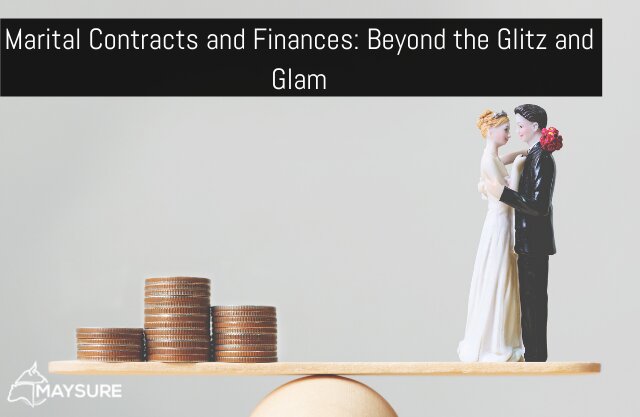Marital Contracts and Finances: Beyond the Glitz and Glam
Marriage is all too often related to the wedding day. We all look forward to the glitz, glam, and celebration. It’s the dream.
But, before the adventure and idyllic happily-ever-after begins, the couple needs to take a look at the financial consequences of their partnership. We can help you achieve a firm grasp on the reality of marital contracts and healthy finances. Keep reading.
What types of marriages are there in South Africa?

Two individuals can tie the knot through a civil union, customary marriage, or civil marriage in South Africa.
Customary Marriage
A customary marriage is performed under African customary law. The partners must be 18 years or older. Under customary law, polygamous marriages are legal.
Civil Union
Civil unions or partnerships recognise same-sex marriages as legal. The rights granted to couples according to the Civil Unions Act and the Marriages Act are the same.
Civil Marriage
A civil marriage is a union entered into by a woman and man. If no contracts are made, this marriage is automatically in community of property.
If your choice is not to get married in community of property, then an antenuptial agreement has to be signed. This means you will be married out of community of property.
What are the requirements for a valid marriage in South Africa?

The individuals who choose to be in a union must give their consent and should be 18 years of age or older. With a civil marriage, if one or both of the partners are younger than 18, consent from the parents or legal guardians is required. However, no individual younger than 18 can enter into a civil union.
A marriage has to be lawful. For example, closely related people are not allowed to get married and an individual who is already married cannot enter into a second marriage. The exception is under a customary marriage.
Certain formalities under the South African law should be adhered to. The marriage has to be conducted by a marriage officer and two witnesses must be present. For a marriage to be considered a legal contractual agreement, it has to be registered at the Department of Home Affairs.
Understanding marriage contracts in South Africa

You need to understand the different types of marriage contracts in South Africa. This helps to forestall legal battles and protect your assets if the marriage does not work out in the future.
In South Africa, there are two types of marriage contracts:
- Marriage in community of property, or
- Marriage out of community of property

If you choose to be married in community of property, all your assets will be shared. If you choose not to share your assets, you need to sign an antenuptial agreement. If no antenuptial agreement is signed, you will be married in community of property automatically.
Marriage in community of property

Marriage in community of property joins together everything you and your partner owned before and during the union. This includes inheritances.
While this may encourage partnership in the relationship, it can also be problematic. You will need written consent from your partner to buy or sell property, including jewellery. Additionally, you will need consent from your partner to enter into credit agreements.
The debt you and your partner had before marriage forms part of the joint estate. You will hold joint responsibility for your partner’s debt.
These are hard truths. On the opposite side of the coin, there are benefits.
There are times where marriages do not work out. This can lead to divorce.
Divorce can be a messy process at times. But, when you are married in community of property, you and your partner receive half of the assets accumulated before and during the marriage.
This means both partners get an equal share and potentially a better quality of life leaving the marriage than they may have if they had married according to an antenuptial contract. Of course, this point could be argued in a number of ways depending on the individuals and the circumstances.
Marriage out of community of property (antenuptial)

This contract has two options: marriage with or without the accrual system.
A marriage contract with an accrual system protects the individual who is considered financially vulnerable in the union. Marriage without the accrual system automatically allows each partner to manage their assets.
Marriage out of community with accrual
Here is an example of the accrual system in action.
This system may protect you if you are the partner who takes the role of a stay-at-home parent. Or, for instance, if you are actively studying without a source of income.
The accrual system also means you’re not liable for your partner’s debt. You’ll be able to grow and manage your assets without the consent of your partner.
And, the assets you owned before the marriage will remain solely yours. Upon death, your will and testament can leave further instructions about what happens to your assets. You can choose whether to leave these assets to your spouse or not.
Marriage out of community of property without accrual

Marriage out of community of property with accrual protects each partners’ assets from before and during the marriage. This supports the idea of regulating assets independently.
You do not need the consent of your partner for any agreements. This can work well for business-minded individuals. In the case of a divorce, your partner cannot claim any of the assets you have grown before or during the marriage.
However, this specific system does not protect you if you are the partner with less financial standing in the marriage. Simply because your partner is not required to share any benefits with you under this type of marriage contract.
Final thoughts on marital contracts and finances

Knowledge is power. And that power comes from marrying your heart with a proper understanding of how to protect your finances within a marriage.
For assistance with marital contracts, please feel free to contact our Maysure Financial Services team. We can help you determine the best marital contract for your needs.
Contact us here:
+27 11 839 2302
Maysure Financial Services is a registered financial services provider. FSP 15173







